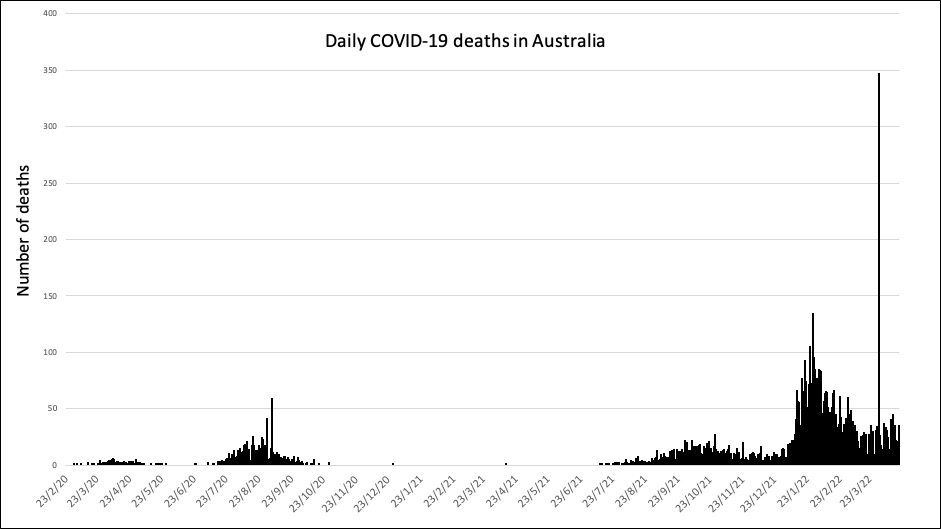And one unlucky woman caught Omicron just 20 days after testing positive to Delta.
Welcome to The Medical Republic’s Covid Catch-Up.
It’s the latest covid news in one convenient post. Email bianca@biancanogrady.com with tips, comments or suggestions.
21 April
- NSW and Victoria scrap 7-day isolation rules for close contacts.
- Woman catches Omicron just 20 days after testing positive for Delta.
- Infection reduces risk of reinfection in unvaccinated people by 85%.
- US federal judge overrules CDC mask mandate for air travel.
- Covid-related research published four times faster than influenza research.
- Omicron still retreating around the world.
NSW and Victoria are scrapping the requirement for household and other close contacts to isolate for seven days after exposure, and ending quarantine for unvaccinated international travellers.
These and other changes to infection-control measures come into effect from midnight on Friday, with health authorities in both states citing the high level of vaccination coverage as justification.
The change to close contact rules means that instead of isolating, household and close contacts are asked to test themselves regularly, wear masks indoors and avoid contact with vulnerable people in the week after exposure.
Victoria is also doing away with the requirement for masks in indoor settings, including primary schools, early childhood, hospitality and retail settings, or public events regardless of size, although they must still be worn on public transport. Masks are also still required in healthcare and aged care settings, but there are no longer any visitor restrictions for hospitals.
In NSW, vaccination requirements will be lifted for most workers except those in disability and aged care.
Meanwhile, 194 Australians died from covid in the past week and just over 300,000 new infections were reported around the country.

A 31-year-old woman who had had three doses of covid vaccine was reinfected with Omicron just 20 days after testing positive for the Delta strain, which could be the most rapid reinfection reported so far.
The case study, presented in a poster at the European Congress of Clinical Microbiology & Infectious Diseases, used whole genome sequencing to confirm the reinfection.
The woman’s first infection with the Delta variant was asymptomatic and detected during routine PCR screening at the healthcare setting where she worked. She experienced cough, fever and other symptoms when reinfected with Omicron.
Prior covid infection provides around nine months of high protection against reinfection in unvaccinated individuals, a study has found.
In a paper published in JAMA Network Open, researchers report the findings of a cohort study of 24,043 unvaccinated individuals who had survived previous covid infection and 97,572 unvaccinated controls without covid.
Cases were followed from three months after their initial infection to nine months, during which time 0.4% of those who had previously had covid experienced a reinfection, compared to 2.8% of controls who developed covid for the first time.
Overall, previous infection reduced the risk of reinfection by 85%, and the risk of hospitalisation from covid by 88%, compared to individuals without previous infection.
A federal judge in Florida has struck down the US Centers for Disease Control’s mask requirements on airplanes, resulting in immediate lifting of the mask mandate around the country, even for flights already in the air.
CNN showed footage of cabin crew circulating with garbage bags to collect passengers’ masks, while the CDC reiterated that its mask order remains in effect, citing a rise in cases since early April.
Covid-related research papers were accepted for publication 11 times faster than influenza-related studies during 2020, but also had a far higher rate of retractions, a study has found.
A paper published in the Pan American Journal of Public Health searched for all studies published in 2020 with either “covid-19” or “influenza” in the medical subject headings, and found more than 31,300 covid research articles and nearly 4300 influenza articles.
Covid articles were accepted for publication 11 times faster – 47% within a week of submission compared to 6.7% of influenza articles, and nearly 20% were accepted the same day. They were also published four times faster than influenza articles.
However, 82 covid papers were retracted, compared to just one influenza paper. Around one-third of the covid retractions or withdrawals were from the same group of authors.
“The shorter editorial process, which made articles available quickly, was initially thought to be an advantage in describing and studying a new disease,” the authors wrote. “However, it seems that a flawed peer review process during the first year of the pandemic may have been, at least in part, the reason for the shorter editorial process in many cases.”
The Omicron wave is still waning around the world, with a 24% drop in new infections and 12% drop in deaths in the past week compared to the week before.
As before, in releasing the optimistic-looking figures, the WHO warns that some countries are changing their testing policies, which could result in an underestimation of the true infection rate.
Omicron continues to account for the vast majority of infections, with less than 0.1% now attributed to Delta.


